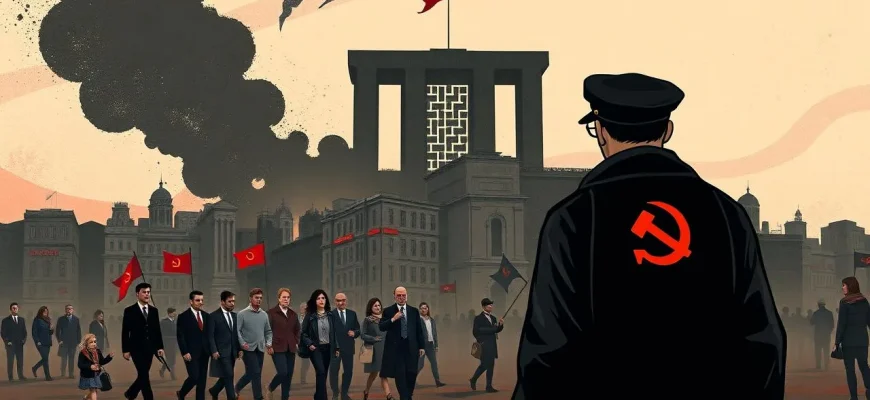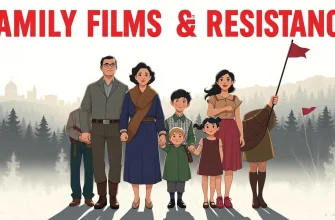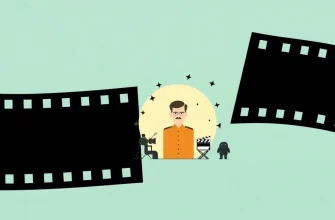Fascism, with its dark allure and devastating consequences, has been a subject of fascination for filmmakers around the globe. This curated selection of films not only sheds light on the historical events that shaped our world but also explores the psychological and societal impacts of fascist ideologies. From chilling historical dramas to poignant character studies, these movies offer a window into the human condition under the shadow of fascism, providing both educational value and a stark reminder of the importance of vigilance against such ideologies.

The Great Dictator (1940)
Description: Charlie Chaplin's satirical masterpiece mocks Adolf Hitler and Benito Mussolini, using humor to highlight the absurdity and danger of fascist regimes. It's both a comedy and a poignant critique of fascism.
Fact: Chaplin played both the dictator and a Jewish barber, showcasing his versatility and his strong stance against fascism.
 Watch Now
Watch Now 
The Pianist (2002)
Description: Roman Polanski's film about Wladyslaw Szpilman, a Polish-Jewish pianist who survives the Holocaust, offers a personal perspective on the horrors of fascism and the resilience of the human spirit.
Fact: Polanski, himself a Holocaust survivor, dedicated the film to his family who perished in the Holocaust.
 Watch Now
Watch Now 
The Book Thief (2013)
Description: Set in Nazi Germany, this film follows a young girl who finds solace in stealing books and sharing them with others, highlighting the power of literature against the backdrop of fascist oppression.
Fact: The film was adapted from Markus Zusak's best-selling novel.
 Watch Now
Watch Now 
The Conformist (1970)
Description: Set in Mussolini's Italy, this film follows a man who joins the fascist secret police to conform to societal expectations, leading to a complex web of betrayal and moral ambiguity. It's a profound exploration of how fascism can manipulate and corrupt individuals.
Fact: The film was inspired by the novel by Alberto Moravia, and its visual style influenced many directors, including Francis Ford Coppola.
 30 Days Free
30 Days Free 
The Damned (1969)
Description: Luchino Visconti's epic drama examines the moral decay of a German industrialist family as they align with the Nazis, offering a chilling portrayal of how fascism can infiltrate and corrupt even the most powerful families.
Fact: The film was controversial for its explicit depiction of sexual perversion and political corruption.
 30 Days Free
30 Days Free 
The Night Porter (1974)
Description: This controversial film explores the complex relationship between a former SS officer and a concentration camp survivor, delving into themes of guilt, power, and the lingering effects of fascism.
Fact: It was banned in several countries due to its graphic content and provocative themes.
 30 Days Free
30 Days Free 
The Fall of Berlin (1949)
Description: A Soviet propaganda film that portrays the final days of WWII from the Soviet perspective, focusing on the defeat of fascism through the lens of the Red Army's victory over Berlin.
Fact: It was one of the most expensive Soviet films ever made at the time of its release.
 30 Days Free
30 Days Free 
The Garden of the Finzi-Continis (1970)
Description: This film tells the story of an aristocratic Jewish family in Italy during the rise of fascism, capturing the gradual encroachment of anti-Semitic laws and the personal tragedies that follow.
Fact: The film won the Academy Award for Best Foreign Language Film in
 30 Days Free
30 Days Free 
The Lives of Others (2006)
Description: While primarily about the Stasi in East Germany, this film touches on the broader theme of totalitarian control, which shares roots with fascist ideologies, through the story of a surveillance officer who becomes emotionally involved with his subjects.
Fact: It won the Academy Award for Best Foreign Language Film in
 30 Days Free
30 Days Free 
Downfall (2004)
Description: This German film provides an intimate look at the last days of Adolf Hitler and the Third Reich, offering a detailed and chilling portrayal of the collapse of fascism from within.
Fact: The film's depiction of Hitler's bunker scenes has become iconic, especially the scene where Hitler rants, which has been widely parodied on the internet.
 30 Days Free
30 Days Free 








